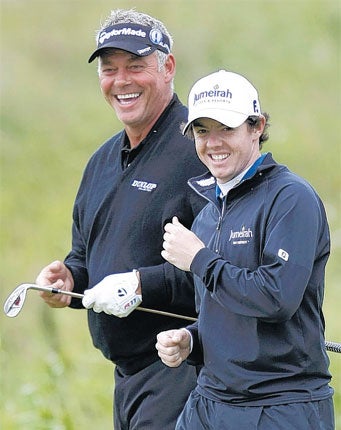Major surgery pays off to save Killarney
Astonishing success of Irish golfers can be used to revive a game hit hard by economic downturn

The Tee Amigos will be the star turn at Killarney this week. Yet far from being a novelty act, Northern Ireland's three major-winners have a serious job in Co Kerry. The challenge of Darren Clarke, Rory McIlroy and Graeme McDowell is to re-establish the Irish Open as an international feature piece.
The financial downturn of the Celtic Tiger means the event first contested in 1927 has no headline sponsor and a prize fund slashed in half to €1.5 million (£1.32m). There are only three members of the world's top 50 in the field, but in Irish terms what a trio they happen to be. "Box office" is an accurate description.
"The ticket sales took a spike after Darren's win at the Open in Sunday," Ben Watson, the championship director, told The Independent on Sunday. "They went up by more than 20 per cent. And before the Darren effect we had the Rory effect, which mean they were healthy anyway."
Indeed, the organisers hope to better the 82,000 attendance of 2010, which would be some feat considering 3 Mobile's sponsorship withdrawallast November left them without a marketing budget. Until McIlroy's US Open glory "flicked a switch", they had hardly sold a ticket. At that stage, just to hold the event would have been an achievement, and without backing of ¤1.25m from the Irish Tourist Board, the Tour might not have gambled. It is a punt destined to pay out.
On Friday, the Stormont Government announced a financial commitment to staging a European Tour event, and if a consortium including JP McManus are still interested then the Irish Open is heading for Royal Portrush. But there could even be two Tour events on the island.
Whatever, it would be daft if Ulster, "the golfing capital of the world" as McIlroy so joyously referred to it in the wake of Clarke's triumph, did not have its own stop on the calendar. And, of course, it would give Clarke's home links a further opportunity to prove its merits as a venue, with the Royal & Ancient promising to look into the feasibility of Portrushhosting an Open.
As ever, Padraig Harrington talks a lot of sense on the matter. As the Golf Union of Ireland oversee the game on both sides of the border, Harrington can claim to have startedthe whole ball rolling. Some 240 majors separated Harrington'sbreakthrough in Carnoustie in 2007 from Fred Daly's Open in 1947.But now the Irish tally amounts to six majors from the past 17 – with four different winners.
Little wonder that Harrington suggests these times are "a one-offfor Irish golf".
"Maybe it will be repeated, but you cannot imagine Ireland ever again having so many players with so many majors between them over such a short period of time," he said. "I don't know if this is the peak but it's a time that will be marked in history for Irish golf, and I think Killarney will draw incredible crowds.
"But going forward, the event still needs building, no doubt about it. The good news is that the likes of Rory, Graeme, Darren and myself are bringing more world ranking points, and that will attract more players."
The three-time major-winner is simply relieved he has a national championship to attend. "It has been a very tough time for the Irish Open. Losing that sponsor in these economic times has been difficult and the Tour, and Tourism Ireland should be applauded.
"We're hoping this is an in-between year and that new sponsors will enhance it on the international stage. It does need enhancing if it is to reach the heights of 1980, when it was one of the Tour's biggest events."
As a qualified accountant, Harrington understands the necessity to cash in while those irons are hot. Golfing tourism brings in €110m (£97m) a year to the Irish economy, but it is in decline. Meanwhile, a report last year warned of a 10 per cent drop in members at the 400-plus clubs, with juniorsections inevitably suffering. Goldenages don't guarantee a golden legacy,as shown by the example of Welsh rugby in the Seventies.
But that is a question for the far-away future. For now the glory is assured; as, says Harrington, it will be for the next generation. "They're talking in Ireland about 'the best juniors we've ever had'," he said. "I go, 'Hang about, look what's just come through'. They say, 'No, now we've got really good kids'."
Subscribe to Independent Premium to bookmark this article
Want to bookmark your favourite articles and stories to read or reference later? Start your Independent Premium subscription today.

Join our commenting forum
Join thought-provoking conversations, follow other Independent readers and see their replies